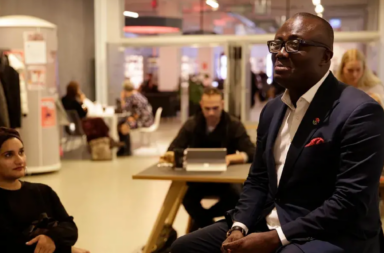This is a guest-post by Hampus Waldemarson, CEO at SHIP, who attended the Investment Lab Copenhagen 2013 event, organized by Startupbootcamp with help from amongst other Bird&bird and Accelerace.
About 200 persons showed up to listen to Jakob Ekkelund from SEED Capital, Tommy Andersen from Libratone, Nicolaj Hoejer Nielsen from Sepior and a interesting role play with Martin von Haller, Jimmy Fussing and Klaus Nyengaard. The main idea behind the event was to give an insight into how Business Angels and VCs act and think when they invest in a startup, as well as how to succeed in raising money for your startup.
The voices about investments
It started out interesting for Öresund Startups when Jakob Ekkelund at SEED Capital showed a previous article from Karsten Deppert that pointing out that a too large portion of presentations tends to be self-glorification rather than interesting facts or news for the crowd. Jakob said he adjusted his presentation technique and held a focused talk with tips and tools about what VCs are looking for when investing – and what startups ought to present to VCs.
Jakob offered the audience five areas which they should prepare to showcase when meeting investors. The five areas presented were; Team; Market; Product; Scalability; Exit. A pitch or presentation that focuses on these five points, as well as tips on how to go about it, will surely get you attention and an clear answer.
The second talk was from Tommy Andersen, representing Libratone. Libratone was besides an interesting success story also a good example of a startup created to fill new needs in shifting markets. Tommy emphasized Jakobs’ earlier presentation that startups in markets with untapped potential is more interesting for investing in. Tommy talked about competing from different angles compared to competitors, thereby ”flanking” competitors rather than going head on – which could potentially end with defeat. For example traditional HiFi companies tends to compete with technology and sound quality while Libratone also competes with design, decorating and new thinking. Thereby Libratone reaches new target groups (read: women) that their traditional competitors don’t reach. Tommy also shared his thoughts about when to consider investment money, saying that the business plan normally chooses when investments are needed. In the case of Libratone production and shipping off products was a natural investment trigger since costs multiply. Advice was given to approach investors in good time if you know when money is needed, giving you more choices making better decisions and forming better partnerships.
Nicolaj Hoejer Nielsen, a serial entrepenuer shared a different opinion. Even though most of the startups where he is currently involved are financed with VC he strongly recommended startups to question the need of money and if possible bootstrap, at least in the beginning. The point being that investments shouldn´t be sought if not needed. Nicolaj shared his experiences that VC normally comes into play rather late in a startups maturity, both saying that perhaps investors should come in earlier and that startups should plan differently. Ultimately a startups idea, team and range determines the need for investments at different stages.
Nicolaj also presented a new breed of business angels investing in IT giving a boot to the old conservative, normally older business angels which he believes haven´t been active in IT and also at too late stages and with too small investments.
A term sheet negotiation simulation
The last and perhaps most appreciated installment was a 45 minute role playing game where Martin von Haller, Jimmy Fussing and Klaus Nyengaard played out an investment negotiation between a VC firm, a startup CEO and his lawyer. The attendants where given a 3 page seed investment contract which was discussed in detail within every clause. The startup CEOs mission was to raise a €300 000 investment, for 20% of equity. Besides giving insight into investment contracts it also spun off into a couple of good advice for startups. Jimmy Fussing (normally at Sunstone Capital) shared his thoughts on negotiating and shared that even if a contract has hundreds of clauses they all regard either valuation or control. For example when negotiating anti-dilution provisions it all boils down to the valuation (hence the economic risk for VC).
Klaus Nyengaard playing the CEO did his best to fend off clauses decreasing founders room for manouver – but also stated that it’s normal that VCs want to protect their investments and need some clauses with control, the negotiation therefor focusing on how much and under what circumstances.
An important lesson is not to include clauses that gives investors the right to control future investment rounds. Martin von Haller paused the role playing at times to give the audience explanations which helped when negotiating complex terms. His most important advice, concurred by the other participants, was to always bring a lawyer or a cunning person along to negotiations.
”Klaus is experienced and has perhaps done 10 of these negotiations, I do 50 a year. – If you don´t bring a lawyer, You will lose!” Jimmy explained further
Attendants were invited to beers afterwards and free drinks at Butcher´s where surely many ideas were vented and hopefully connections made. I know that I enjoyed it.
“It was a great event, especially the role-playing. The longer the discussion went on the more points would be discussed, causing the negotiation to get more and more complex, and making it difficult for both parts to remember what they actually agreed on. The role play really opened my eyes to how complex getting funding can become. The main lesson from this was: keep it simple.” said Dimitrij Aleshkov, who enjoyed the show next to me in the audience.


